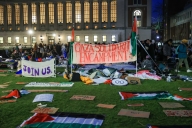You have /5 articles left.
Sign up for a free account or log in.
Rutgers University at New Brunswick removed Michael Chikindas from teaching any required course and from a campus leadership role, following an investigation into the food science professor’s anti-Semitic Facebook posts.
Robert Barchi, Rutgers president, and Deba Dutta, campus chancellor, announced the suspension Friday in an email to faculty members, saying it was one of several actions the university is taking in the case.
“A fundamental expectation of a university is to provide an environment in which students can learn, discover their passions and do research free from fears of discrimination, harassment or disruption,” Barchi and Dutta said. “So, too, should our faculty and staff expect a professional environment that is welcoming and free from discrimination.”
 Chikindas, who did not immediately respond to a request for comment, has previously said that his Facebook account was “hacked,” and that he couldn’t be sure he posted all the content that many called objectionable. (Examples of his posts, many of which include offensive language and images, such as the image at right, can be found here.)
Chikindas, who did not immediately respond to a request for comment, has previously said that his Facebook account was “hacked,” and that he couldn’t be sure he posted all the content that many called objectionable. (Examples of his posts, many of which include offensive language and images, such as the image at right, can be found here.)
After a university investigation based on relevant policies and the law, however, Barchi and Dutta said, Chikindas “was found to have posted extensive bigoted, discriminatory and anti-Semitic material” that “perpetuated toxic stereotypes and was deeply upsetting to Jewish students, faculty and staff across our community.”
Aspects of the university’s investigation remain confidential. But Barchi and Dutta shared several outcomes, including that Chikindas will be removed from teaching required courses so that no Rutgers student “will be required to take a course that he teaches.” Rutgers also removed Chikindas from his leadership role as director of the Center for Digestive Health at the Institute for Food, Nutrition and Health, so that no employee will have to work for him.
Chikindas also will be required to participate in a cultural sensitivity training program and be subject to “ongoing monitoring if and when he returns to the classroom,” according to the announcement.
Rutgers is seeking further disciplinary action, in line with policies outlined in the American Federation of Teachers- and American Association of University Professors-affiliated faculty union contract.
“This has been a sad and deeply troubling situation for our students and our staff, and for our faculty, who stand for much nobler values than those expressed by this particular professor,” Barchi and Dutta said. “While the university is and should always be a place that challenges students to grapple with complex and even controversial ideas, this situation has threatened the trust between professors and students that is a prerequisite to learning.”
They added, “It is our hope that we can navigate these difficult conversations together and that, having been tested by these challenges, we can emerge stronger and with renewed appreciation of our common bonds.”
Rutgers’s faculty union had no immediate comment Sunday.
John Wilson, an independent scholar of academic freedom who has been following the Chikindas case, referred a request for comment to a post he wrote for AAUP’s “Academe” blog, of which he is co-editor. Wilson said that he agreed with Rutgers that Chikindas’s posts were indeed bigoted and anti-Semitic. “But “what exactly is ‘discriminatory’ about a social media post?” he asked. “Discrimination is an act against someone violating their rights. Social media opinions are not in themselves discriminatory.”
Such opinions might indicate that someone could act in a discriminatory way, he said, but it at least appears that Rutgers found no evidence of any action. Perpetuating “toxic stereotypes” is not a violation of any campus rules, he said, and therefore not grounds for disciplinary action.









